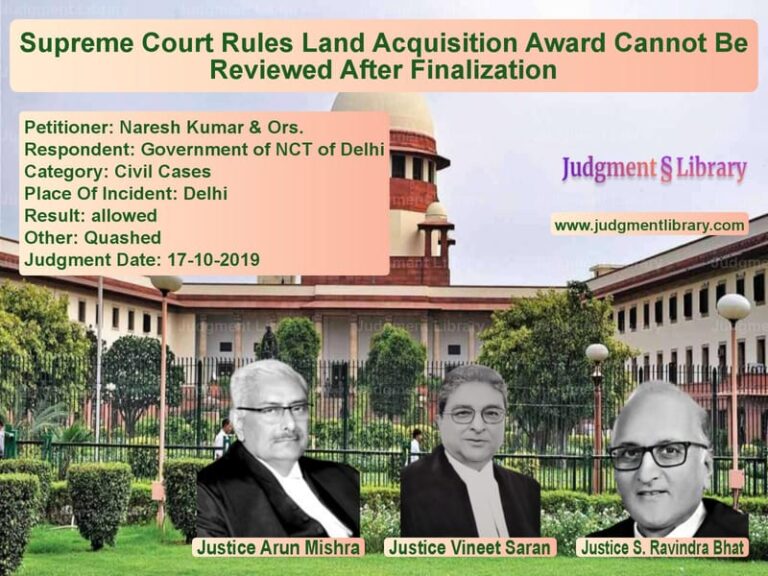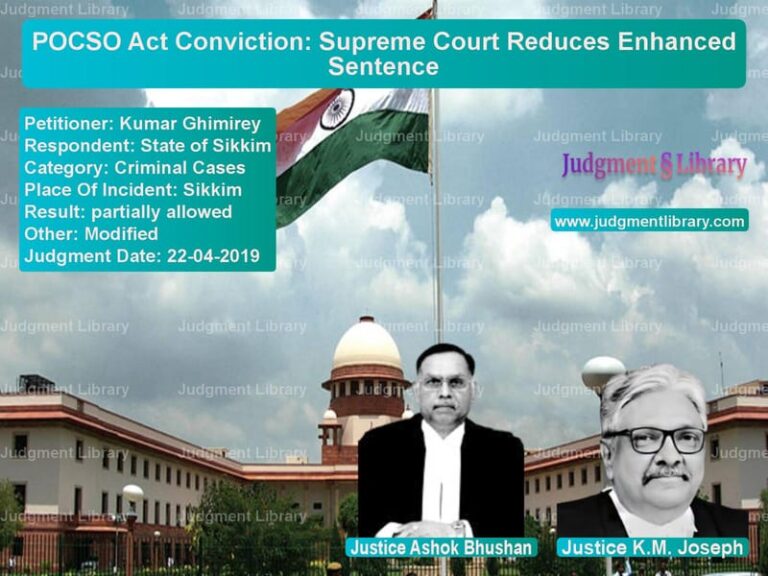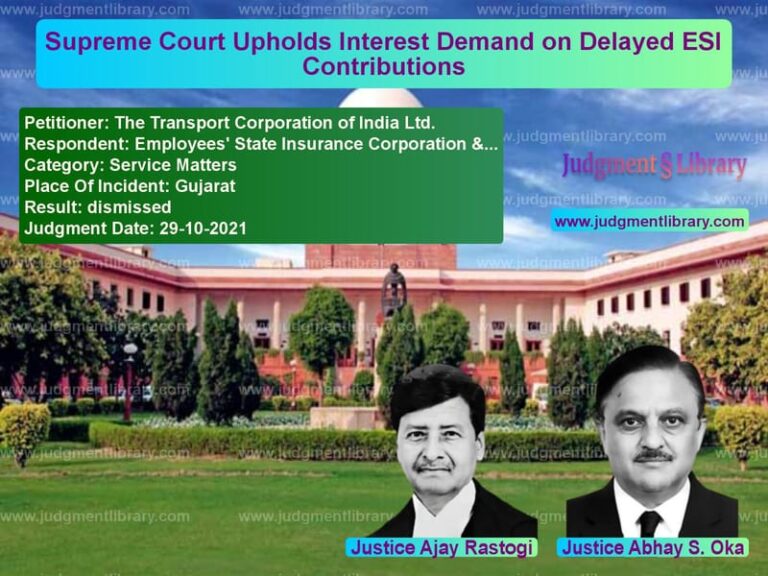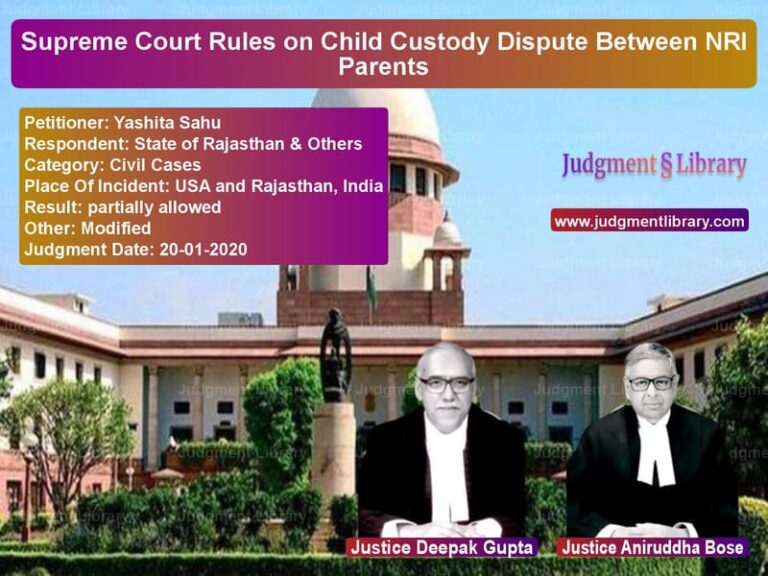Supreme Court Rules on Insurance Liability for Election Duty Deaths
The Supreme Court of India, in the case of National Insurance Company Ltd. vs. The Chief Electoral Officer & Others, addressed a crucial issue concerning the liability of an insurance company for the death of a government employee during election duty. The case revolved around whether a heat stroke suffered while on duty could be covered under an insurance policy that required ‘accidental death caused by external, violent, and visible means.’ The Court ruled in favor of the insurance company, setting aside the Patna High Court’s decision.
Background of the Case
The case arose from the death of a police constable, Deval Ravidas, who was on election duty during the Bihar Legislative Assembly by-polls in May 2000. He suffered a heat stroke and passed away on May 26, 2000. His widow, the second respondent, applied for compensation under an insurance policy entered into between the National Insurance Company and the Chief Electoral Officer of Bihar. The policy provided coverage for accidental death during election duty.
The Chief Electoral Officer denied the claim on the ground that the death was due to a heat stroke, which did not meet the criteria of an ‘accident caused by external, violent, and visible means’ as per the policy. The widow approached the Patna High Court, which ruled in her favor, directing the insurance company to pay Rs. 10 lakh as compensation.
Aggrieved by this decision, the National Insurance Company challenged the High Court’s order before the Supreme Court.
Arguments by the Petitioner (National Insurance Company Ltd.)
- The insurance company contended that the policy only covered deaths caused by accidents resulting from ‘external, violent, and visible means.’ A heat stroke does not meet these criteria.
- It was argued that insurance contracts must be interpreted strictly, and courts should not alter their terms.
- The petitioner pointed out that the claim was lodged 11 years after the incident, violating the policy’s requirement for immediate notification.
- The insurance company emphasized that election duty deaths due to natural causes such as heat stroke cannot be classified as accidental under the policy.
Arguments by the Respondent (Chief Electoral Officer & Widow of Deceased)
- The respondents argued that the deceased constable was on election duty in extreme weather conditions, and his death should be considered work-related.
- The widow contended that a heat stroke is an unexpected medical emergency and should be classified as an accident.
- The Chief Electoral Officer claimed that the insurance company had been notified within a reasonable time and was responsible for compensating the widow.
- It was also argued that the insurance company should honor the policy’s objective of providing financial security to families of deceased election duty personnel.
Supreme Court’s Analysis and Judgment
The Supreme Court analyzed the terms of the insurance policy and its applicability to the case. The key findings were:
- Strict Interpretation of Insurance Contracts: The Court reiterated that insurance contracts must be interpreted based on their explicit terms, and coverage cannot be extended beyond what is clearly mentioned.
- Definition of Accidental Death: The Court held that an accident under the policy must involve an external, violent, and visible cause. A heat stroke does not fit this definition.
- Delay in Filing the Claim: The Court noted that the claim was filed 11 years after the incident, well beyond the stipulated period for notifying the insurance company.
- No Employer Negligence: The Court found that the Chief Electoral Officer did not submit the claim within the policy period, making it legally untenable.
The Supreme Court ruled:
“The insurance policy explicitly states that compensation is payable only for death resulting solely and directly from an accident caused by external, violent, and any other visible means. A heat stroke, being a natural cause, does not satisfy these conditions. Moreover, the failure to notify the insurance company within the required timeframe further disqualifies the claim.”
Final Verdict
- The Supreme Court set aside the Patna High Court’s decision.
- The insurance company was not liable to pay compensation for the heat stroke-related death.
- The ruling reinforced that insurance policies must be interpreted as per their specific terms and conditions.
This judgment establishes a significant precedent in interpreting insurance policies, ensuring that claims are processed based strictly on policy terms. It also clarifies that natural causes of death, such as heat strokes, do not qualify as accidental deaths unless explicitly covered under the policy.
Petitioner Name: National Insurance Company Ltd..Respondent Name: The Chief Electoral Officer & Others.Judgment By: Justice Sanjay Kishan Kaul, Justice Abhay S. Oka.Place Of Incident: Bihar.Judgment Date: 07-02-2023.
Don’t miss out on the full details! Download the complete judgment in PDF format below and gain valuable insights instantly!
Download Judgment: national-insurance-c-vs-the-chief-electoral-supreme-court-of-india-judgment-dated-07-02-2023.pdf
Directly Download Judgment: Directly download this Judgment
See all petitions in Other Insurance Cases
See all petitions in Judgment by Sanjay Kishan Kaul
See all petitions in Judgment by Abhay S. Oka
See all petitions in allowed
See all petitions in Quashed
See all petitions in supreme court of India judgments February 2023
See all petitions in 2023 judgments
See all posts in Insurance Cases Category
See all allowed petitions in Insurance Cases Category
See all Dismissed petitions in Insurance Cases Category
See all partially allowed petitions in Insurance Cases Category







